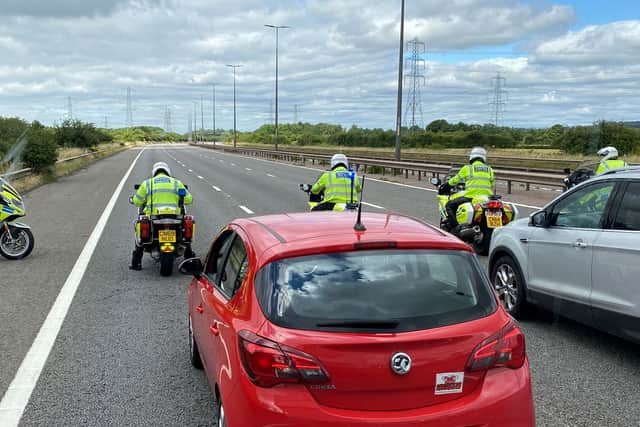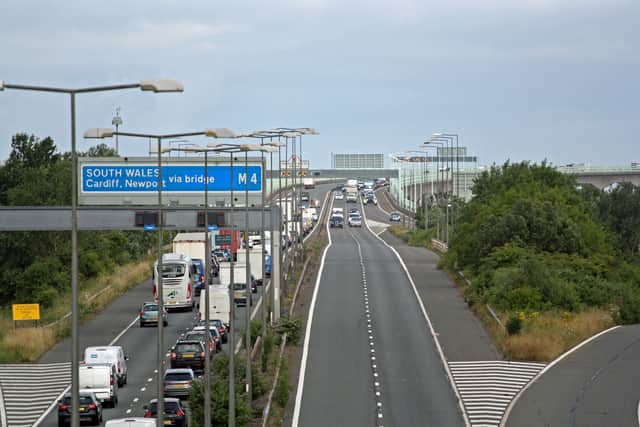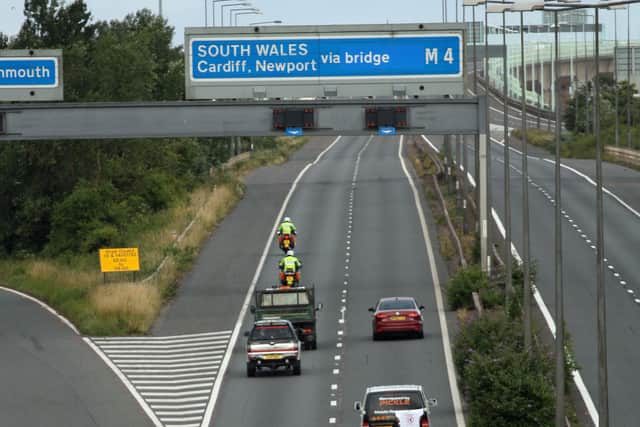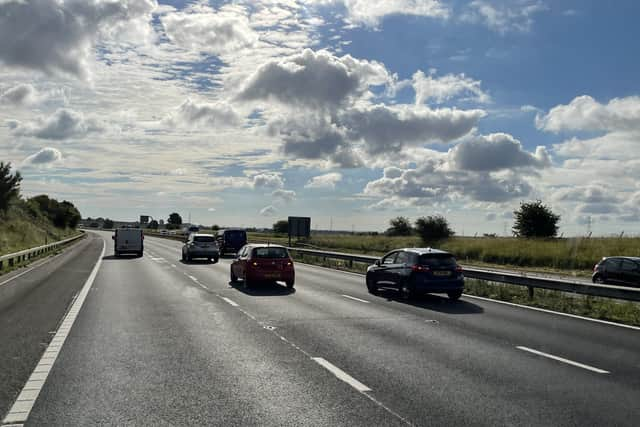Fuel price protest: where are July 2022 protests in UK, police warnings and traffic latest on A12, M5, M4
and live on Freeview channel 276
Police arrested 12 people during the M4 protest over fuel prices for driving too slow on Monday, saying the demonstration was putting emergency services “at risk”.
Fuel protests have been taking place across the UK as drivers call for a cut in fuel duty, gridlocking motorways and major A-routes with a series of rolling go-slow roadblocks.
Advertisement
Hide AdAdvertisement
Hide AdThe latest figures from Experian show the average price of petrol reached a new high of 191.5p per litre on Sunday, while the average price of diesel was 199.0p per litre.
Protesters who took part in a roadblock across the Prince of Wales Bridge, between South Wales and Somerset, on Monday morning were stopped and told they were being detained for driving below the agreed 30mph speed for a prolonged period of time.
Motorists have been protesting with a ‘go slow’, with cars travelling well below the speed limit for a prolonged period of time.
The protests, which started at around 7am, are understood to have been organised via social media under the banner Fuel Price Stand Against Tax, although police said their discussions were held with the organiser of the M4 ‘stand up to fuel prices’ protest.
Advertisement
Hide AdAdvertisement
Hide AdRolling protests started simultaneously on the M4 from Magor services in South Wales and the junction 20 Almondsbury interchange near Bristol, with police telling demonstrators they could not stop and must drive no slower than 30mph.
Police escorted the two blockades as they crossed the River Severn but prevented them from completing the return journey by halting the convoys and arresting the drivers. The Prince of Wales Bridge was closed for over an hour in both directions.
Dozens of police vans and hundreds of officers from both Gwent Police and Avon and Somerset Police were on the scene at 8.30am when four people were arrested and 10.45am when another eight people were arrested.
FairFuelUK founder Howard Cox said he is “fully supportive” of the demonstrations so long as they are conducted legally, adding that “people have reached the end of their tethers”.
Advertisement
Hide AdAdvertisement
Hide AdHe said other countries had cut fuel duty by more than the UK and asked “why the hell are we not doing it here?”, while also calling for a cut of at least 20p and warned that protests will continue if not.
He added: “There is an appetite (for such protest). If the government don’t actually deliver on this, I think there’s going to be some serious escalation of protests.”


What did the Home Office say?
Priti Patel urged police to use new powers to stop fuel protesters bringing gridlock to motorways and major A-routes across the UK.
Along with giving the police greater powers of dispersal, the government increased penalties.
Advertisement
Hide AdAdvertisement
Hide Ad“Obstruction of the highway” used to be punishable by a maximum fine of £50, it now carries up to a six-month prison sentence and/or an unlimited fine.
The new measures to tackle non-violent demonstrations that have a significant disruptive impact on the public came into effect on 28 June as part of changes to the law.
A Home Office source who spoke to the Daily Mail said: “Through our Police, Crime, Sentencing and Courts Act, we have given the police a wealth of powers to deal with disruptive and damaging protests, including imprisonment and unlimited fines for those blocking a highway - actions which inflict further pain on those affected by rising prices.
“The Home Secretary would encourage and support the police to make use of all the powers available to them. Forces need to move people on. These protests are blocking people from getting to work and from carrying out other vital journeys - this is not about whether you believe in the cause or not.”
Advertisement
Hide AdAdvertisement
Hide AdWhy are protests taking place?
The protests are understood to have been organised via social media under the banner Fuel Price Stand Against Tax.
Figures from data firm Experian show the average price of a litre of petrol at UK forecourts reached a new record high of 191.4p on Thursday, while diesel rose to 199.1p.
The government said that while it understands people are struggling with rising prices and have a right to protest, “people’s day-to-day lives should not be disrupted” and warned that traffic delays “will only add to fuel use”.
A government spokesperson said: “While we respect the right to protest, people’s day-to-day lives should not be disrupted, especially on busy motorways where lives are put at risk and resulting traffic delays will only add to fuel use.
Advertisement
Hide AdAdvertisement
Hide Ad“The new Public Order Bill will make it a criminal offence to glue yourself to a dangerous motorway, which sees police spending hours trying to safely remove people.”
However, the protest may have caught the ey of Chancellor Rishi Sunak, who said he will carefully consider calls for a “more substantial” fuel duty cut after the 5p per litre reduction implemented in March failed to halt price rises.
Mobile welder Richard Dite, 44, from Maesteg, South Wales, said it is costing him hundreds of pounds in fuel to get to work every week due to price hikes.


He told the PA news agency: “It’s costing me £300 a week before I even get to work and earn anything.
Advertisement
Hide AdAdvertisement
Hide Ad“My only option soon will be to put the welding gear in the shed and call it a day, maybe go on the dole.
“Face it, at this rate I’ll be on more that way.”
Martin Crowley, 48, from Cardiff, said he is a self-employed exotic animal courier and fuel prices are damaging his livelihood.
He said: “Fuel cost me £280 over two days last week. It’s unbelievable”
“You can hardly make a living anymore.”
The AA claimed petrol wholesale costs ended last week 10p down on the record highs of early June.
Advertisement
Hide AdAdvertisement
Hide AdThe organisation’s fuel price spokesman, Luke Bosdet, said: “It is an outrage, plain and simple, that the fuel trade could be slashing petrol prices as the nation heads towards the holiday season, but isn’t.”
Where have protests been reported?
Protesters targeted the M4 in South Wales and Somerset, and stretches of the M5 from Devon to Bristol, on Monday 4 July.
Protests also took place on the A38 in Devon and at a Tesco petrol station in Shepton Mallet.
There were demonstrations on the M54 in Shropshire, near the Ferrybridge services in West Yorkshire, on the A64 in the York area, on the M180 near Scunthorpe, and on the A12 in Essex.
Advertisement
Hide AdAdvertisement
Hide AdIn a series of 30mph rolling roadblocks, the protesters were able to bring disruption to road networks during the morning rush-hour.
The protests started at around 7am and are expected to last until 7pm.
Demonstraters also targeted the Prince of Wales Bridge, crossing between England and Wales.


Rolling protests had started simultaneously on the M4 from Magor services in South Wales and the junction 20 Almondsbury intercharge near Bristol, with police telling demonstrators they could not stop and must drive no slower than 30mph.
Advertisement
Hide AdAdvertisement
Hide AdPolice escorted the two blockades as they crossed the River Severn but prevented them from making the return journey.
For more than an hour no traffic was able to cross the M4 Prince of Wales Bridge in either direction because of the demonstration.
Meanwhile, Devon and Cornwall Police tweeted: “We are aware of a go-slow protest having commenced at 7:10 am from Exeter Services heading northbound.
“This is currently around a dozen vehicles in size and is being accompanied by police vehicles to ensure the safety of all road users.”
Advertisement
Hide AdAdvertisement
Hide AdDevon and Cornwall Police have also said a slow-driving convoy set off from Exeter services along the M5 on Monday morning, as well as another along the A38.
Avon and Somerset police said in a tweet: “A slow-moving rolling roadblock is under way on the M4.
“A number of vehicles will head east over the Prince of Wales Bridge and expected to exit the M4 at J22 (Pilning).
“There they plan to re-join westbound towards Wales. A similar protest from the England side is also expected.”
Advertisement
Hide AdAdvertisement
Hide Ad

Protesters also blocked the A12, causing rush hour chaos. However, according to the AA, this disprution is now over.
The protest caused traffic to build from junction 26, A1124 Essex Yeomanry Way (Eight Ash Green / Tollgate interchange) in Colchester to junction 22 (Witham North).
Have any arrests been made?
Some 13 protesters were arrested on Monday for driving too slowly.
Police said there has been a leagal menimum speed limit in place, but serveral drivers had been caught breaching it.
Advertisement
Hide AdAdvertisement
Hide AdTweleve were arrested in south Wales, and one was arrested in Devon.
Gwent Police chief superintendent Tom Harding said that those arrested had breached the legal notice put in place to protect the public during the protests, and were found to be driving on the motorway at under 30mph for “a prolonged amount of time”.
He said: “Over the last two weeks, we have been working jointly with a number of partners to ensure that emergency and critical services could continue and to prevent serious disruption to both road users and local communities.
“The right to protest under UK law must be balanced with the rights of the wider community who may be affected.
Advertisement
Hide AdAdvertisement
Hide Ad“Along with partners, we identified that failing to comply with the legal notice requirements would lead to emergency and critical services being restricted therefore posing a risk to local communities, action was taken when I deemed these risks existed.
“We are aware of other driving offences, not connected to the protest, such as the use of a mobile phone whilst driving. These offences will be dealt with appropriately.”
Meanwhile, Devon and Cornwall Police said a motorist in his 50s was arrested on the A38 for a public order offence after allegedly driving repeatedly at a “dangerously low speed”.
Comment Guidelines
National World encourages reader discussion on our stories. User feedback, insights and back-and-forth exchanges add a rich layer of context to reporting. Please review our Community Guidelines before commenting.